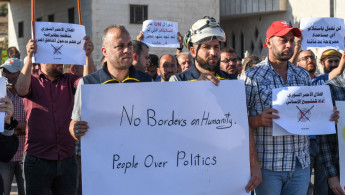Syria: Aid not resumed via Bab Al-Hawa, says UN, amid famine warnings
The UN said Tuesday aid deliveries are yet to restart via the primary crossing into opposition-controlled northwest Syria, some three weeks after a deal with the regime of President Bashar al-Assad was announced.
Stéphane Dujarric, spokesperson for the UN secretary-general, told journalists operational details for sending United Nations aid through Bab Al-Hawa were still being finalised, official Turkish news agency Anadolu reported.
He said UN assistance was arriving in the war-torn country via two other crossings with Turkey at Bab Al-Salama and Al-Rai.
Living conditions in aid-reliant northwest Syria are very difficult and there are warnings that the humanitarian situation there could spiral out of control.
More than two million internally displaced people live in camps there, according to the UN Office for the Coordination of Humanitarian Affairs.
In a Monday statement, the Syrian Network for Human Rights (SNHR) said: "In the past week, we have observed that bread has run out in most camps, with continued water shortages and price rises for most food supplies."
It noted that the delivery of UN humanitarian assistance via the Bab al-Hawa Crossing has been halted for seven weeks and warned that this could cause "a humanitarian catastrophe that may reach the levels of a famine in northwestern Syria."
The United Nations announced earlier in August a deal with the Syrian regime to reopen Bab Al-Hawa, a lifeline for opposition-held northwest Syria.
The regime also agreed to extend use of the Bab Al-Salama and Al-Rai crossings until 13 November.
These two additional crossing points were approved by the Syrian regime in February following a devastating earthquake which ravaged northwest Syria and southern Turkey and killed around 50,000 people.
The UN Security Council had failed to adopt either of two rival resolutions in July to authorise further deliveries through Bab Al-Hawa.
One of these resolutions, proposed by Brazil and Switzerland, would have been approved had Russia, a key ally of the Syrian regime, not used its veto on the council. A competing Russian proposal was voted down.
The SNHR said in its Monday statement that it "reiterates its legal position, which we noted three years ago, that the delivery of UN relief aid does not require permission from the Security Council".
The war in Syria began in 2011 and has killed nearly a half million people. Russia intervened on the regime's side four years later.
Agencies contributed to this report.





 Follow the Middle East's top stories in English at The New Arab on Google News
Follow the Middle East's top stories in English at The New Arab on Google News

![MP Essam Diab's pursuit to block TikTok in Egypt has revived an already ongoing debate in the country. [Getty]](/sites/default/files/styles/image_330x185/public/1230748046.jpeg?h=a5f2f23a&itok=-8MqBLLC)
